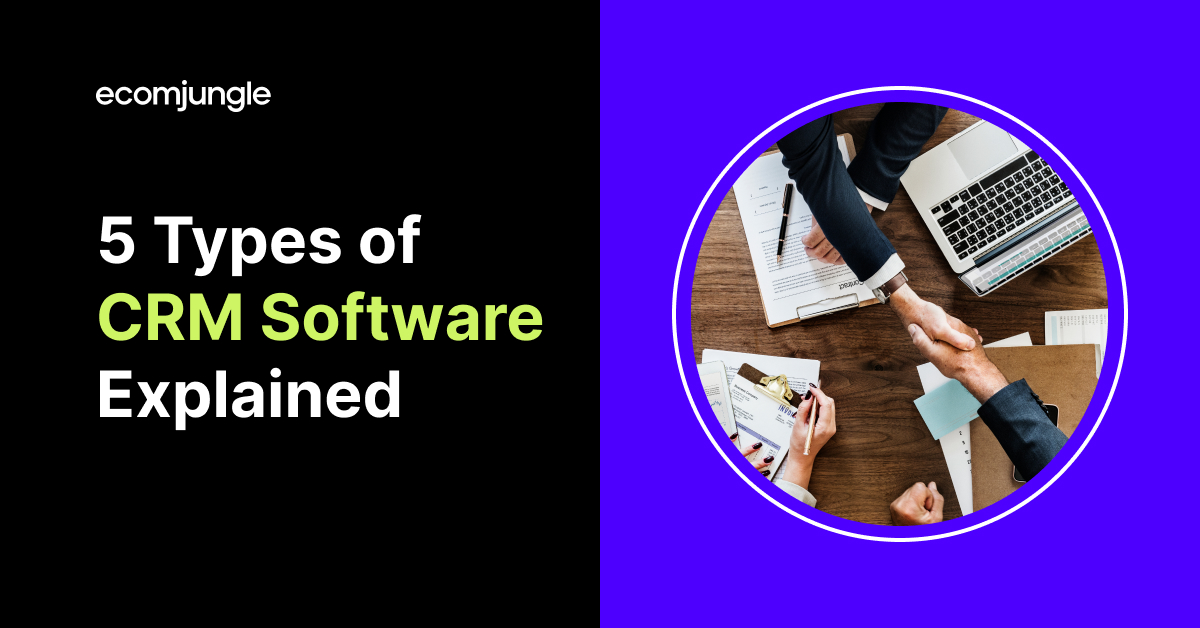
5 Types of CRM Software Explained
CRM platforms are on the list of the most essential and innovative enterprise technologies available to businesses. Why? Because of the way they leverage customer information to manage accounts, leads, and sales opportunities in one place.
Without a proper CRM strategy, customer information will be disorganized, and it will be challenging to keep track of all the touch points and interactions you have had with individual customers. It results in a prolonged sales cycle with a generic customer experience and poor quality.
When you have a solid CRM strategy for your business, you can establish personal connections with customers, which, in turn, helps you identify their needs and requirements, as well as offer them personalized services.
Read on and learn more about the functionalities and types of CRM software and what these platforms do!
What Is A CRM Software?
Customer Relationship Management or CRM allows companies to track every interaction with current users, leads, and customers.
Although the software’s capabilities may encompass various aspects beyond customer relationships, they are referred to as “CRM software” or simply “CRM”.
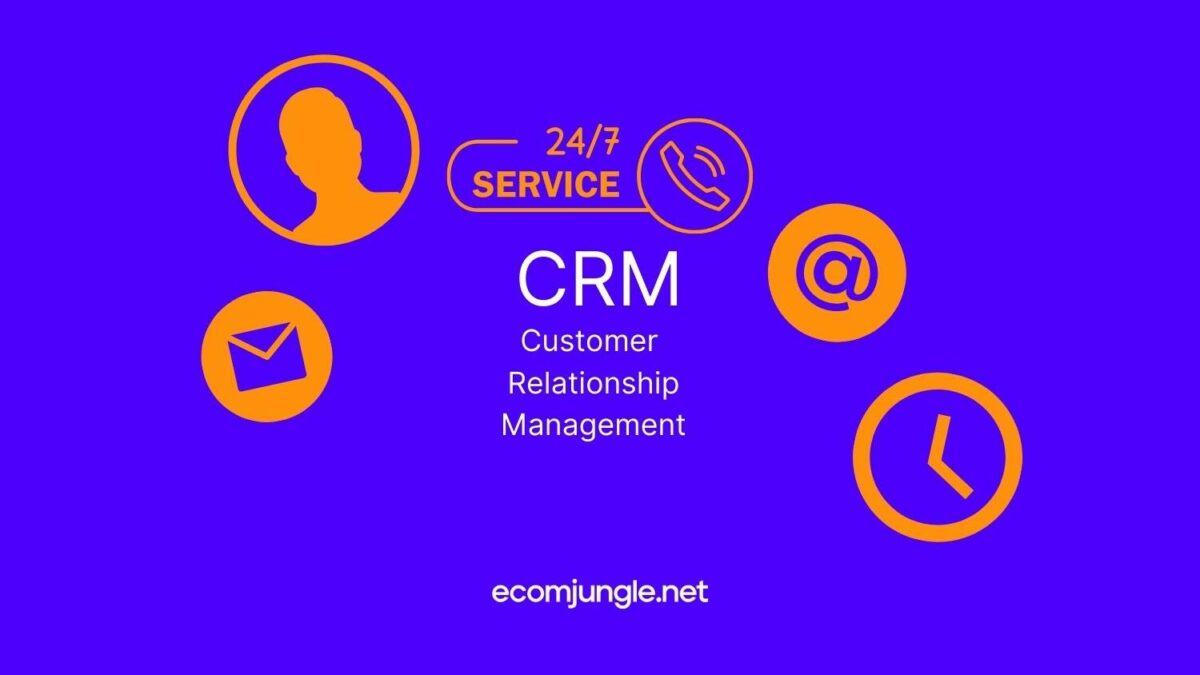
Most CRMs have features necessary to track the names, emails, and phone numbers of current users and customers. Others can track phone calls, keep track of emails sent to leads, and track the social media feeds of those users.
The best CRMs that offer more advanced and complex systems can direct leads to the right sales reps and keep track of interactions with technical support or customer service teams.
Are you ready to discover how CRMs can make your sales take off?
Main Benefits Of A CRM Software
What are the benefits of a CRM? Finding the answer to this question can make the difference between success and failure in a company. After all, the number of competitors has increased fourfold in the last year, and building customer loyalty is no longer accessible.
The good news is that a sales CRM can improve the lives of both customers and salespeople.
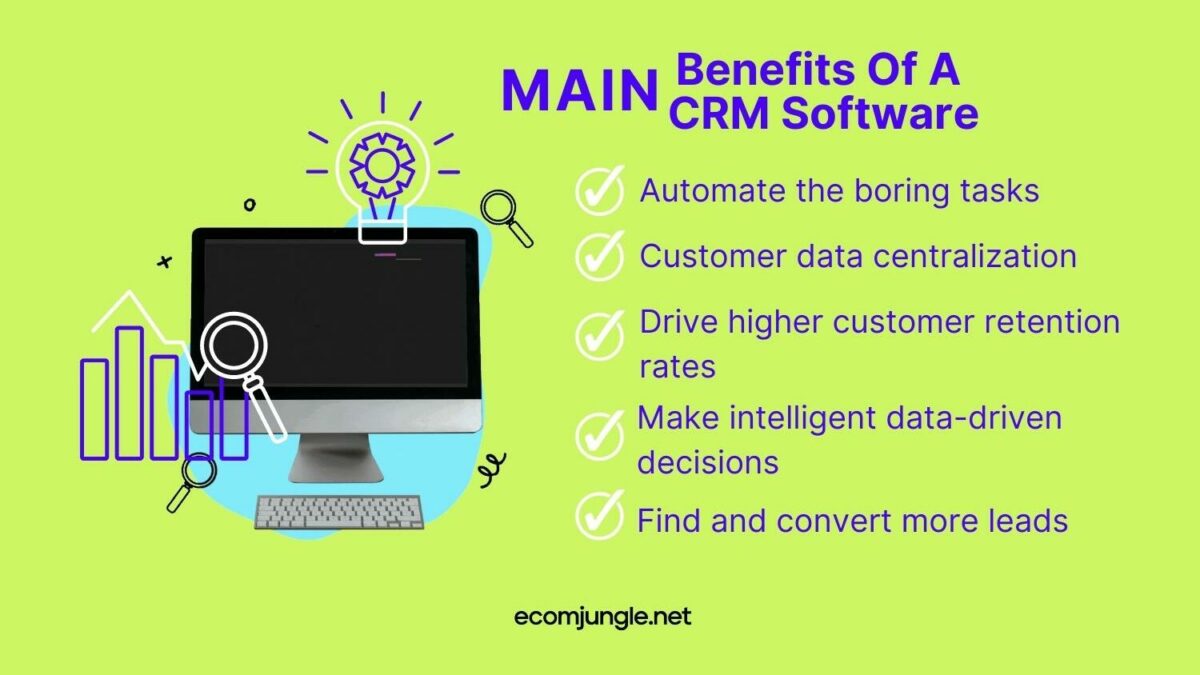
According to think tank Dynamic Consultants Group, the average ROI of a CRM in 2021 was about $30 for every $1 spent.
Customer data centralization
When your business is in its infancy, managing all customer information in spreadsheets may be feasible, but it is not advisable.
The amount of time spent on data entry could be better spent on attracting customers and winning business.
It becomes increasingly complicated as you grow your business and expand your customer base. So, a CRM is helpful even is you are a freelancer.
It is where CRM software comes in. It’s hard to make crucial decisions when your customer data is spread across Excel sheets, business cards, and notes taken during meetings with them. It takes too much time and effort to collate and understand the data.
Find and convert more leads
CRM tool can help you identify, support, and follow up on quality leads. It means you won’t invest time and resources in a lead that may not turn into an actual customer.
You can guide more leads more efficiently, along with a reduced sales cycle, and convert them into satisfied customers in a considerably shorter time.
It’s just great!
Drive higher customer retention rates
While the quality of your product or service goes a long way in determining your customer satisfaction, the sheer number of choices means that the impact of the quality of your customer relationships is essential.
It is one thing for your products to provide value. It’s quite another for your customers to be happy to do business with you.
Most people only want to do business with companies that recognize them as individuals. And the best way to do that is to incorporate CRM software into your company.
Among other features, customer relationship management software provides you with a complete customer view, interaction logs, segmentation, interest management, and many other tools that allow you to maintain a close and personalized business relationship and increase the customer lifecycle, regardless of the size of your customer base.
Make intelligent data-driven decisions
Accurate data from across your organization enables decision makers to stay informed, so they react to market trends with better decisions.
Detailed reports will show you how your teams are performing and opportunities for improvement.
It should be noted that customer relationship management software is, first and foremost, a program that allows any company to manage all its information and centralize it.
Not only all the data and actions related to customers, but in single comprehensive project management software, you can store, systematize and process all the information about existing and potential customers and employees or suppliers.
Automate the boring tasks
A CRM allows your teams to forget repetitive tasks and concentrate on the activities that matter.
And with segmentation, each customer can be routed to the proper marketing automation, sales automation, or customer service automation based on their buying journey.
It’s amazing for startups and big companies, so your teams will focus on most important activities.
Help your team stay productive by defining and creating effective processes for your business. This way, CRM can help you ensure that standards are met while operations are executed. Automate routine activities to ensure your sales team spends time closing deals and not wasting it on repetitive tasks.
Are you ready to get on the road to success?
What Are The 5 Types Of CRM Software?
Knowing how to choose between the existing CRM types is one of the essential keys before contracting any of the different possibilities.
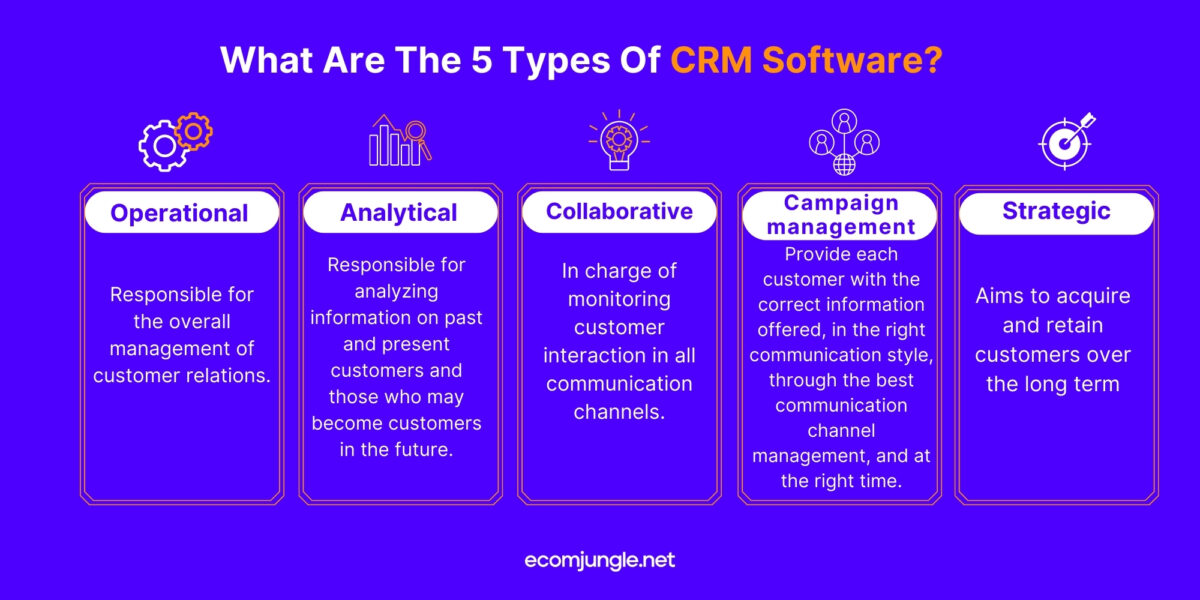
The main types of CRMs are the following:
1. Operational CRM
Operational CRM systems are responsible for the overall management of customer relations.
Likewise, an operational CRM often receives information on customer satisfaction with the company’s service and products. Its objective is to create new strategies for approaching and dealing with customers at all sales cycle stages (marketing automation, sales automation, and customer service automation).
In addition, an operational CRM is in charge of automating processes to offer a closer experience at the moment of interaction between customers and companies.
It is usually the most common type of CRM for companies starting to use these services, as an operational CRM encompasses the three central departments.
2. Analytical CRM
It is responsible for analyzing information on past and present customers and those who may become customers in the future.
Analytical CRM systems establish trends, its approach is panoramic (its analysis is not specific but global), and it seeks to generate factual information by collecting as much data as possible.
In addition, it classifies customers and generates profiles with behaviors or preferences within the sales cycle. It allows you to determine more accurately what customers are looking for and define what type of content they are inclined to learn about new services or products offered by your company.
3. Collaborative CRM
Collaborative CRM systems are in charge of monitoring customer interaction in all communication channels.
It is where customers’ possible interactions with the sales or customer service department are concentrated. Therefore, the information it provides is handy for improving customer relations.
In addition, it facilitates the concentration of all interactions with leads (which are found in an assortment of digital media) and channels those who are most likely to become new customers.
4. Campaign management CRMs
A campaign management CRM aims to provide each customer with the correct information offered, in the right communication style, through the best communication channel management, and at the right time.
In this sense, the optimal offer, the follow-up offer, and the right timing are established. These offers are oriented to the real needs of the customers.
In this process, all customer contact points established so far are considered. For example, contacts generated through sales, service automation, or eCommerce and the corresponding customer reviews.
Based on this knowledge, all advertising campaigns are optimized, such as direct mailings, e-mail marketing automation or telemarketing, and letter or sales automation campaigns.
5. Strategic CRMs
Strategic CRM is a customer-centric system that aims to acquire and retain customers over the long term. It does this by using data that reveals a company’s customers’ preferences, behavior, and trends.
As a prominent feature of CRM types, Strategic CRM focuses on customer needs and seeks the best way to meet their expectations.
Which type of CRM is best for your company?
What Features Should You Look For In CRM Software?
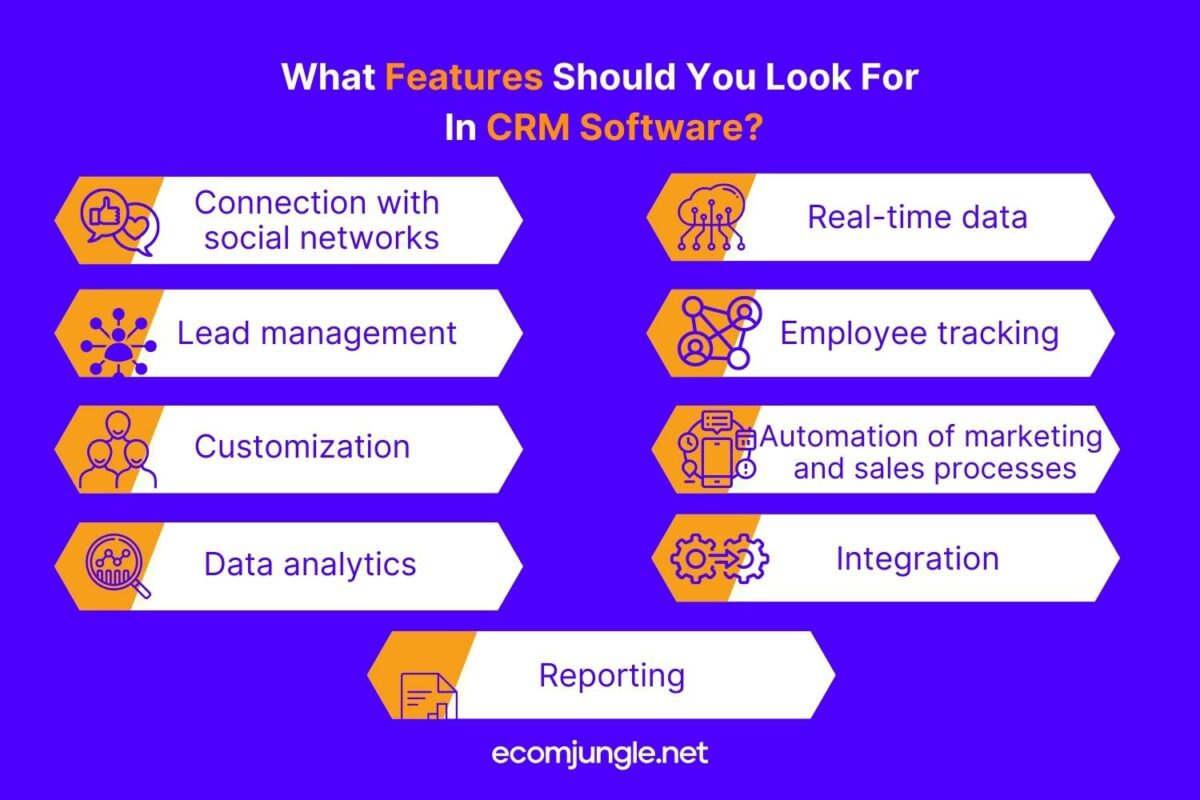
The features and solutions that you should look for in a CRM system are:
Lead management
It is one of the most important parts since the CRM will be able to indicate the needs and preferences of each particular lead and suggest the best way to approach or respond to them to move them forward in the buying cycle.
Automation of marketing and sales processes
It will free up your employees’ time in both areas to spend on more productive tasks.
Customization
Its adaptability to your company’s processes is essential. You don’t want a CRM that has features you need but lacks other essential ones.
In addition, if it is a Low-Code CRM, you can be sure that you will be able to add or adapt applications as your business grows or your needs change.
Integration
It is not about discarding other technological tools that you have already adopted but about integrating the CRM as an extension that facilitates organizational processes and improves the customer experience.
Employee tracking
A good CRM should also have the ability to provide you with information on the performance of your employees, monitoring their activities.
Connection with social networks
Incorporating social network monitoring functions will save time for the marketing area, in addition to being able to extract valuable information about the audience and prospects.
Real-time data
The customer changes, as do their doubts and questions. The CRM must offer you data about their online interactions and their communication with your sales representatives to provide them with relevant and timely information. You can also collect data on the market behavior and your audience to make better decisions when promoting your brand or products.
Data analytics
The information collected is useless if it is not analyzed. A CRM should segment your market from the data, track the profit and loss of your campaigns to determine the return on investment or ROI, and analyze users’ online behavior.
Reporting
And in the same vein, the analysis will be useless if the results are not presented in comprehensive, complete, and easy-to-interpret reports.
Remember that a CRM can help your business improve the customer experience and boost sales.
Which CRM are you going to start using?
Conclusion
As you have observed, having a CRM in your company is of vital importance to be able to know your customers better and to be able to implement strategies to build customer loyalty and thus increase your company’s revenue.
Likewise, numerous CRM software options on the market could be helpful for your company. It all depends on what features are essential for your business and your employees.
However, the best way to determine your need is to talk to your team members. This way, you can establish what CRM features your team will need globally.
Remember that within each type of CRM, there are many options to find a type ideal for every company.
Choosing the right CRM system for your company will give you complete control of all the company’s processes. From sales to marketing, sales management, accounting, or finance.
Choose the best CRM for your company right now!
Frequently Asked Questions
What are the major types of CRM?
Initially, CRM was only a marketing element, but now CRM types are studied independently and are developed through systems or software. Based on activities and functions, CRM systems have been segmented into three main categories: operational CRM, analytical CRM, collaborative CRM, campaign management CRM and strategic CRM.
Does CRM require a large IT investment?
Executives often reject at first glance the idea of making a CRM investment because of the initial outlay involved. However, the optimizing work of CRMs allows for a high ROI for every dollar invested in a CRM. Thus, the economic benefits far outweigh the investment costs.
What are CRM tools?
CRM tools are designed to help your organization provide a unique and seamless customer experience and build better relationships. To do this, it gives a complete picture of all customer interactions, allows you to track your sales, organize and prioritize opportunities, and facilitates cross-team collaboration.
What is CRM software used for?
The CRM stores information about current and potential customers (such as name, address, phone number, etc.) and identifies their activities and points of contact with the company. It includes customer site visits, phone calls, email exchanges, and other interactions.